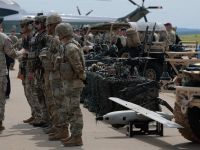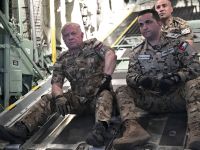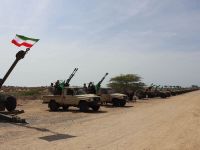A hard-fought nuclear deal hung in the balance as Iran and the United States ended talks Monday in Oman, with signs the haggling would continue right up until a Nov. 24 deadline.
Over the past two days U.S. Secretary of State John Kerry and Iran’s Foreign Minister Mohammad Javad Zarif sought to overcome deep differences, allay mutual suspicion and bring 12 months of diplomatic brinkmanship to the point of a breakthrough.
As each laid out their demands in private, warnings came that a final agreement may prove elusive, but in their only public comments in over 10 hours of talks neither man revealed what remained unresolved in the long-running bid for a comprehensive accord.
Asked if they were making progress, as they appeared briefly for photographers, Zarif replied: “We will eventually.”
Kerry said: “We are working hard. We are working hard.”
U.S. State Department spokeswoman Jen Psaki said the talks had proved “tough, direct and serious.” Psaki added that the U.S. remained “very focused on making progress and seeing if we can get a deal done before the deadline.”
“There’s still time to do so,” she told reporters in Washington.Iran’s deputy foreign minister Abbas Araghchi said “no progress” had been made during the two days.
“We can no longer talk about progress in the negotiations, but we are optimistic that we can reach an accord” before Nov. 24, he said.
Meanwhile, Israel’s Prime Minister Benjamin Netanyahu said Iran remained “unrepentant” and “unreformed,” warning the West against rushing into a deal with it on its nuclear program.
Netanyahu said he would send a letter to world leaders warning them not to let Iran off the hook as the deadline approaches. He added that Iran continued to call for the annihilation of Israel and should not be negotiated with or allowed to become a nuclear power.
“Don’t rush into a deal that would let Iran rush to the bomb.”
U.S. President Barack Obama said Sunday that a “big gap” remained on how the West could have “verifiable, lock-tight assurances” that Iran could not obtain a nuclear weapon.
“We may not be able to get there,” Obama told CBS News.
The Iranian delegation is under pressure to deliver a quick and total lifting of U.S., U.N. and European sanctions under a final deal.
Obama, however, said sanctions would only be “slowly reduced” if Tehran met its obligations.
The key sticking point is thought to be the number and type of uranium-enriching centrifuges Iran should be allowed to keep spinning in exchange for sanctions relief and rigorous inspections of its nuclear sites.
Iran denies it is seeking a bomb and insists that its nuclear program aims to produce atomic energy to reduce the country’s reliance on fossil fuels, requiring a massive increase in its ability to enrich uranium in coming years.
The duration of a final settlement plan between Iran and the P5+1 group – Britain, China, France, Russia and the U.S. plus Germany – also remains contested, with Iran speaking of five years and world powers suggesting at least double that.
Some analysts have said a deal may already be out of reach.
“A full-fledged agreement is no longer possible before the deadline.
What is still achievable is a breakthrough that could justify adding more time to the clock,” said Ali Vaez, senior Iran analyst at the International Crisis Group.
“What is needed is a courageous political decision that neither side appears compelled to take until the 11th hour.”
Zarif and President Hassan Rouhani are under fire from lawmakers who are skeptical of the interim deal and have demanded a final agreement must be ratified by parliament.








